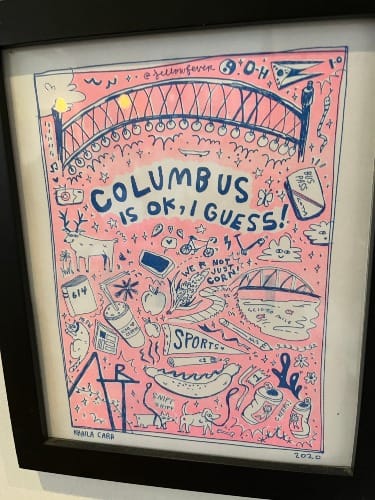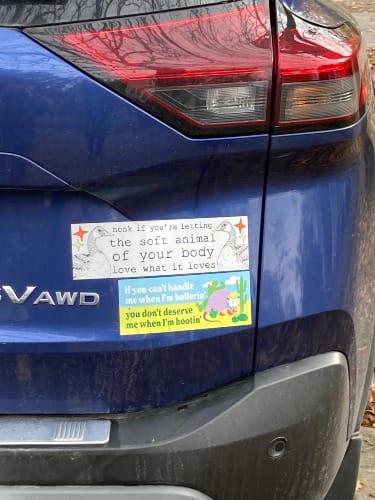#17 What is the Opposite of Alienation?
Wrestling with political cynicism and learning to cultivate connection with the work of Hannah Arendt, Franco Berardi, Zen, and Gillian Welch
Hello from my hometown of Columbus, Ohio where a poster at a bookstore says “We R Not Just Corn” and the first snow of the season lightly dusts a progressive “In This House We Believe” yard sign left over from the last attempts to resist the Trump presidency.
As the weeks go by I cycle between bouts of grief, fear, disbelief, anger, cynicism, nihilism, and escapism. I bury myself in the latest media reports, absorb fiery calls to action and consider logging on and writing my own reactive post but keep stopping myself. Something is telling me what I am feeling and how I’d like to move forward are more nuanced than could be contained on the very platforms that oversimplify our realities and pit us against each other.

In the run-up to the election I, ever suggestible to handwritten recommendations from bookshop clerks, picked up the Italian critical theory book Breathing: Chaos and Poetry by Franco “Bifo” Berardi, which investigates our loss of agreed-upon reality and overabundance of meanings (or as he calls them, signifiers) in networked digital life. He observes that “ignorance and cynicism intermingle aggressively” in the US as the “sphere of the knowable” grows but the ability to interpret it or take effective action is shrinking. I find myself agreeing, but also wondering: why does it feel so impossible to meaningfully engage in politics?
Initially I thought about the fact that so much political discourse is now happening on social media platforms which ascribe to the logic of endless growth, accelerating circulation of media beyond what the brain can process, and algorithms trained to addict through emotional triggers. It has been well documented how this results in vast ideological splits of reality. When this dynamic is accompanied by increasing wealth inequality, a warming planet, automation of jobs, etc, it makes sense that people “in the real world” feel disempowered and humiliated and want to find an easy identity to cling to. Still I didn’t feel like this adequately explained what I was feeling.
I came across an interesting framework from the late German political theorist Hannah Arendt through a past episode of one of my favorite podcasts, Philosophize This. (here's the episode and transcript if you’re curious) Many readers may remember Arendt’s work having a bit of a moment last time Trump was elected with her 1951 book Origins of Totalitarianism flying off the shelves, but it is the idea of “world alienation” in her later work that set me on the path to write the newsletter.
According to the episode, she lays out the three types of human activities. The first is “labor” which is domestic chores and all the other basic activities that keep a person functioning. The second is “work” which she intriguingly defines as creating cultural artifacts; this could be anything from being part of the process of creating goods, doing services like mowing grass, or something abstract like creating art. The third and final mode is “action” which is the realm of the political. She argues this third category is what imbues our world, cultural artifacts and lives with meaning.
Her theory is that in modern times the realm of economics has been engulfing the realm of the political, keeping us in a shallow loop between labor and meaningless work. She sees us becoming “worldless specimens” as we solely internalize the identity of an “agent of the economy” and are shut out of taking action or feeling like a participant in the public political realm where meaning-making and the creation of common ethics happens. As a result, "World alienation" is when we only see ourselves as atomized individuals and not part of multifaceted assemblages and ecological systems.
The lonely and spiritually deadening effects of world alienation make it harder to work together on complex issues and, in lieu of introspection, often leads individuals towards nationalism, organized religion, all-or-nothing politics and the accompanying fear of the “other” that comes along with tribal, binary identities. I'd say this is not just a problem with right-wing politics but on some level affects most current political thinking, even people I mostly agree with.
This begs the question “what then is the opposite of alienation?” What does it look and feel like as a group practice, as a personal practice, mentally, spiritually? What would it be like for you? This is not a hypothetical question, but one worth really considering: what could sustained meaningful connection look like? This could probably fuel a whole lifetime of searching! Would time feel different and less connected to money? Would we feel more okay with creative collaboration unbound by the need for professional accomplishment? Would we be more curious in regard to the people and non-people around us? Could “the political” feel less like sports fandom and more of a natural extension of regular people's lives?? Do we have to be feeling this anxious all the time???

Yesterday I caught an incredible performance from folk duo Gillian Welch and Dave Rawlings, and woke up thinking about a lyric from The Day The Mississippi Died: “If we can’t even argue then what else can we do?” In Breathing, Franco Berardi similarly wondered at what point political disagreements can be relevant instead of bad faith. He theorized there needs to be both a sense of universality and of empathy. This is a monumental task. Take universality, this would involve not dehumanizing people we disagree with, even those who sometimes say truly despicable things, to not fully disregard those with lives we don’t understand. For empathy, it would involve opening ourselves up to an overwhelming influx of deeply difficult feelings. That’s all before Berardi thinks group ethical behavior could even start. It certainly makes sense that people would lean towards political cynicism and nihilism if these basic building blocks of community dialog do not readily exist.
One way forward towards universality and empathy I’ve been personally putting into practice is becoming more aware of not subconciously categorizing people. Similar to the slippery Zen idea of nonself, Berardi speaks of identity not as fixed but as a constant day-to-day process of identification. I don’t mean to gloss over the current extreme impacts external identity can have on a person’s day to day life and outcomes but I do think we have hit a moment where it is too easy to build an inflexible self-identity with its own baggage of narratives and assume far too much of each other based off of cultural signifiers. I see this problem only getting worse as social media increases the speed in which meanings and customs are made and assigned. As an exercise, try walking around a random area and paying attention to your own thoughts and assumptions as you see groups of strangers. It is far easier to slip into a closed mindset of snap-judgments than neutral observation. For some bonus points, you could even try to take on the Buddhist practice of metta and direct feelings of loving-kindness towards all beings, even the tourist who is on their phone blocking the entrance to the subway.
I keep coming back to Berardi comparing the etymologically similar words of humiliation and humility and how they are two possible ways of dealing with political setbacks. Humiliation is the more natural reaction, to be angry, to give up, to seek easy answers, to demonize. Humility is what is needed to see our flaws clearly, to understand why our way of seeing the world is not popular right now, to see ourselves and others as human instead of an amalgamation of our politicized assumptions. Then it is possible to build bridges towards collective flourishing.
As I pondered “what is the opposite of alienation?” I thought back to when the internet was fun and how good it felt to trade cassette tapes of my music or send musicians messages of encouragement. So I fired up thee ol’ instagram to offer up some trades and encourage people to share something meaningful in return. The result was an international life-affirming deluge of original poems (one was the first someone had ever shared!), visual art, and songs that collectively nearly brought me to tears. I know it will take more than a poem and mailed cassette to change the world but Berardi does mention how poems also have the power to stretch language and create new avenues of meaning, so it has to be better than online doomsaying and identity-solidifying politicization at least.
In a time where reality is so hard to agree upon with others, I'd like to find other ways forward other than being a world-alienated “agent of the economy”. I’d like to instead practice curiosity, compassion, and connection for the purpose of finding common ground and fighting the actual forces (*cough, greedy multinational corporations and their owners, cough*) that pit us against each other. Because, as Franco says at the end of his book, “when the illusion of meaning is shared, it is no longer an illusion: it becomes reality”
Humbly (and always a little humiliated),
Jordan

Growing at the Edges is a place for me to reflect and freestyle on ideas found throughout the month as part of my music-writing + existing process. This letter and full archive are available for free to subscribers (like you!) of the Mutual Benefit band mailing list. If you wish to support the band for $1 or more, future letters will simply be sent directly to your inbox. This can be done on the "account" settings on our website.
Always feel free to drop me a line at mutualbenefitmusic@gmail.com
The band can also be directly supported via purchasing merch + records
